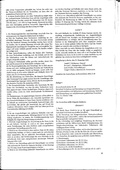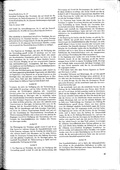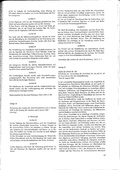Control Council Directive No. 38
The Control Council Directive No. 38 was one of the Allied Control Council adopted on 12 October 1946 directive on the "arrest and punishment of war criminals , Nazis and militarists and internment , control and monitoring of potentially dangerous Germans".
Together with Directive No. 24, Directive 38 specified the Control Council Act No. 10 and was intended to standardize both the arbitration chamber proceedings and the prosecution of Nazi perpetrators and suspects who were in custody at the time.
Responsible groups of people
For the fair assessment of the responsibility and for the use of atonement, according to Art 1 of Directive No. 38 formed five groups.
Main culprits
The main culprits were to be brought to court and, if guilty, punished. These included according to Art. II of Directive No. 38 in particular the active members of the organizations classified as criminal in the Nuremberg Trial against the main war criminals, as well as persons who, for political reasons, committed crimes against victims or opponents of National Socialism , in Germany or in the occupied territories, for example in Poles treated foreign civilians or prisoners of war in violation of international law or participated in any form of killing, torture or other atrocities in a concentration camp , labor camp, internment camp, sanatorium or nursing home , as well as every member of the High Command of the German Armed Forces or Anyone who holds a leading position in the government of the Reich , the Länder or in the administration of the formerly occupied territories such as the General Government , which is only held by leading National Socialists or important supporters of the National Socialist tyranny could be operated.
Article VIII of the directive provided for war criminals to be sentenced to death as well as penitentiary or prison for life or for a period of 5 to 15 years. Other main culprits could be imprisoned or interned for up to 10 years, as well as the confiscation of property, the inability to hold a public office including the notary's office and the legal profession, the loss of legal claims to a pension or benefit payable from public funds and the Loss of the right to vote and stand for election, including the right to participate in political activities as a member of a political party or as a teacher, preacher, writer, editor or radio commentator.
Confiscated assets were distributed in accordance with Directive No. 50 issued under Control Council Act No. 2 in accordance with Directive No. 57 of January 15, 1948.
Burdened
According to Article III of Directive No. 38 Activists , Militarists and Beneficiaries.
Activists were particularly active in the ideological field, for example, as staunch supporters of the National Socialist tyranny, openly admitted to their racial doctrine in particular , "poisoned the youth in spirit and soul through National Socialist teaching or education", illegally intervening in the administration of justice in the service of National Socialism , for example a position as judge or public prosecutor at a special court is politically abused or values of art or science are "mocked, damaged or destroyed."
Militarists, on the other hand, had " drawn up or disseminated militaristic teachings or programs by word or deed " or had been actively involved in an organization (with the exception of the Wehrmacht) that served to promote militaristic ideas. These included, for example, the Reich Ministry for Armaments and Ammunition , the Freikorps , the Black Reichswehr or the Kyffhäuserbund .
Beneficiaries had materially enriched themselves in a special way during the Nazi regime, for example, as so-called old fighters, they were given an office or a position solely on the basis of their membership in the NSDAP, indirectly or directly at the expense of those who were politically, religiously or racially persecuted, especially the so-called Aryanization or by exploiting forced laborers to gain advantages for oneself or for others, to make inappropriately high profits in armaments or in war deals or to gain unjustified wealth in connection with the administration of formerly occupied territories.
Art. IX of the directive Nrt. 38 Similar to a prison sentence or internment of up to 10 years for performing reparation and reconstruction work, the confiscation of property, the inability to hold a public office including the notary's office and the legal profession, the loss of legal rights to a Pension or allowance payable from public funds as well as the loss of the right to vote and stand for election, including the right to participate politically as a member of a political party or as a teacher, preacher, writer, editor or radio commentator, as well as restrictions on living space and residence and other professional bans in freelance professions or the requirement to only do "ordinary work" in dependent activities.
Less burdened
According to Art. IV of Directive No. 38, the minimum burden was those who either belonged to the group of those who were incriminated, but who, due to special circumstances, seemed worthy of a milder assessment, unambiguously and clearly turned away from National Socialism and its methods at an early stage, or whoever was not reprehensible as a victim or had shown brutal behavior and expected probation based on his personality. Those who belonged to the group of followers, but had to prove themselves first because of their behavior and personality, were also less burdened.
The classification of members of political parties or organizations in Germany who had contributed to the NSDAP's seizure of power , such as the Tannenbergbund or the Pan-German Association , people who had made substantial donations to the party, members of the German Christians and the German Faith Movement, and winners of certain awards like the Spanish cross was to be examined carefully.
The probation period to be ordered was two to three years (Art. X of Directive No. 38). It depended on the behavior during the probation period to which group the victim was finally assigned. During the probationary period, in particular, certain professional bans could be imposed, for example teaching, preaching, editing, writing or broadcasting commentator, in the case of civil servants also reducing the pension, transferring to retirement or to an office of lower rank or to one another department with a reduction in pay, the cancellation of a promotion or the transfer from civil servant to salaried employment. Internment in a labor camp or confiscation of all property were expressly not intended.
After her first classification as a victim, Winifred Wagner was able to achieve a classification as a minor burden by appeal.
Fellow travelers
Followers had only participated in the National Socialist tyranny as nominal partisans or supported it, e. B. only paid membership fees, participated in assemblies whose attendance was compulsory, or performed insignificant or ongoing obligations as prescribed for all members. Followers were also candidates of the NSDAP who had not yet been finally accepted as members.
Registration requirements or residence restrictions could be imposed on fellow travelers, as well as the loss of the right to stand as a candidate, and civil servants could also be subject to certain legal disadvantages such as those with less stress. Depending on the length of the NSDAP membership, the amount of the contributions and other benefits paid, as well as the financial, employment and family circumstances, payment to a reparation fund could also be ordered.
In the three western occupation zones, more than 1/3 of the proceedings ended with a classification as followers, in the French zone alone even more than half.
Relieved
Art. I No. 5 of Directive No. 38 designated those persons of the above groups as exonerated who could prove to a panel that they are not guilty. According to According to Art. VI, in order to convince the Arbitration Chamber on the basis of one's own statements or that of exonerating witnesses, despite formal membership in the NSDAP or one of its organizations, not only behave passively, but also actively resisted the National Socialist tyranny to the best of my ability and suffered disadvantages as a result . No atonement could be imposed on relieved persons.
Prominent examples are Veit Harlan and August Haußleiter .
implementation
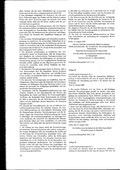
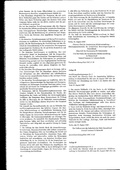
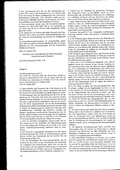
The groups of people formed to assess responsibility and to call for atonement measures should become generally binding for the four zones of occupation with the Control Council Directive No. 38. However, this standardization did not come about because the implementation of the specifications was the responsibility of the respective occupying power .
The directive was applied in the Soviet zone of occupation through the SMAD order No. 201 and the implementing provisions issued by the German Economic Commission , its auxiliary body, differently than in the western zones as a criminal law. The implementation referred not only to the prosecution of Nazi crimes, but also to “violations of the occupation regime”. The settlement with National Socialism should also serve to enforce the communist claim to leadership. In connection with Article 6 of the GDR Constitution , the Control Council Directive 38 formed the basis for the GDR's political criminal law . The passage
"An activist is also anyone who, after May 8, 1945, endangered or possibly endangers the peace of the German people or the peace of the world through propaganda for National Socialism or militarism or through the invention and dissemination of tendentious rumors"
became in the GDR the "universally applicable crime of political criminal law".
The directive was suspended for the Federal Republic on May 5, 1955 by Article 2 of Law No. A-37 of the Allied High Commission , for the GDR by resolution of the Council of Ministers of the USSR on the dissolution of the High Commission of the Soviet Union in Germany on May 20 September 1955.
Individual evidence
- ↑ Control Council Directive No. 38: Arrest and punishment of war criminals, National Socialists and militarists and internment, control and surveillance of potentially dangerous Germans ( Memento of the original from September 4, 2018 in the Internet Archive ) Info: The archive link was inserted automatically and has not yet been checked. Please check the original and archive link according to the instructions and then remove this notice. dated October 12, 1946. Full text from verfassungen.ch
- ↑ Control Council Directive No. 24. Removal of National Socialists and persons who are hostile to the efforts of the Allies from offices and positions of responsibility ( Memento of the original from August 17, 2018 in the Internet Archive ) Info: The archive link was automatically inserted and not yet checked. Please check the original and archive link according to the instructions and then remove this notice. dated January 12, 1946. verfassungen.de, accessed on August 17, 2018
- ↑ Breakdown of the denazification classifications in the western zones of occupation (1949-1950) German history in documents and images (DGDB), accessed on September 9, 2018
- ^ Karl-Heinz Janßen : Nazi rule: A people of followers. Why the Germans remained loyal to Hitler to the last Die Zeit , March 1, 1991
- ↑ cf. Otto Langels: Denazification after 1945: Blossom white in the economic miracle Deutschlandfunk , February 6, 2017
- ^ The denazification scientific services of the German Bundestag , elaboration of September 27, 2011, p. 8
- ^ A b Petra Haustein: History in Dissent: The disputes about the Sachsenhausen memorial after the end of the GDR . Leipziger Universitätsverlag , 2006, p. 68f.
- ↑ s. on this, Federal Ministry for Internal German Affairs / Federal Agency for All-German Tasks - GDR Regulations on Property Issues and Expropriations, Bonn, 1971 with Implementing Regulations No. 1 - No. 3 as well as the decree of the head of the German judicial administration of the Soviet zone of occupation in Germany of September 18, 1947 for the implementation of the order No. 201 of the SMAD in Gerhard Fieberg / Harald Reichenbach (ed.): Expropriation and open property issues in the former GDR, Volume I, Cologne 1991, Document 2.9.9.4
- ^ A b Heinz-Peter Schmiedebach , Karl-Heinz Spieß : Student revolt in the early GDR. Resistance to the transformation of the Greifswald Medical Faculty into a military medical training center in 1955 . Franz Steiner Verlag , Stuttgart 2001, p. 85. and Federal Agency for Civic Education: War Crimes Prosecution in the Soviet Zone and the early GDR, last viewed on September 21, 2016
- ↑ Torsten Diedrich , Rüdiger Wenzke : The camouflaged army . Military History Research Office , Ch. Links Verlag , Berlin 2001, p. 492.
